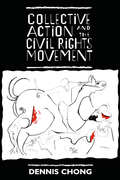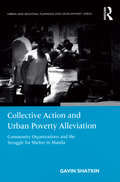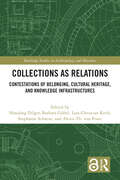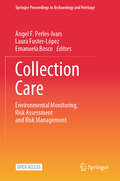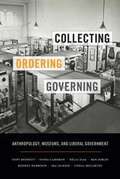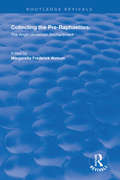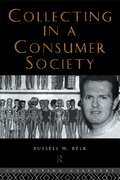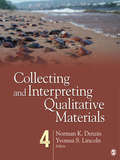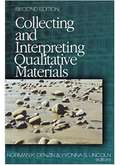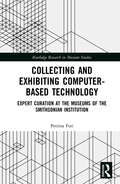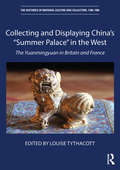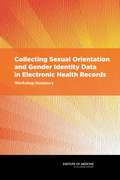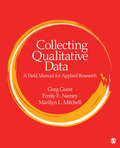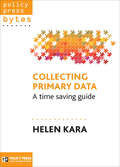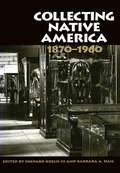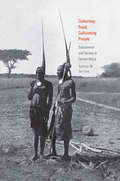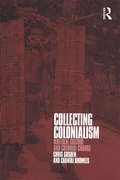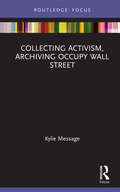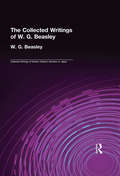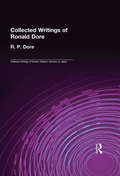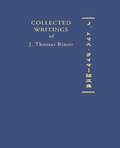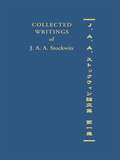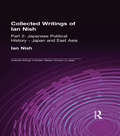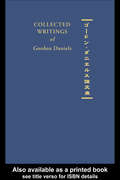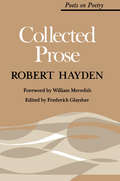- Table View
- List View
Collective Action and the Civil Rights Movement (American Politics And Political Economy Ser.)
by Dennis ChongCollective Action and the Civil Rights Movement is a theoretical study of the dynamics of public-spirited collective action as well as a substantial study of the American civil rights movement and the local and national politics that surrounded it. In this major historical application of rational choice theory to a social movement, Dennis Chong reexamines the problem of organizing collective action by focusing on the social, psychological, and moral incentives of political activism that are often neglected by rational choice theorists. Using game theoretic concepts as well as dynamic models, he explores how rational individuals decide to participate in social movements and how these individual decisions translate into collective outcomes. In addition to applying formal modeling to the puzzling and important social phenomenon of collective action, he offers persuasive insights into the political and psychological dynamics that provoke and sustain public activism. This remarkably accessible study demonstrates how the civil rights movement succeeded against difficult odds by mobilizing community resources, resisting powerful opposition, and winning concessions from the government.
Collective Action and Urban Poverty Alleviation: Community Organizations and the Struggle for Shelter in Manila (Urban And Regional Planning And Development Ser.)
by Gavin ShatkinAn estimated 600 million people now live in informal or 'squatter' settlements in the rapidly growing cities of the developing world. With such settlements often lacking basic necessities, there is an urgent need to address this urban crisis. Recently, innovative approaches have focused on the role of community-based organizations (CBOs) in setting up self-help and participatory programmes. This incisive book questions whether communities have the ability to organize, engage government and undertake major redevelopment. It also examines when and how mobilization of communities occurs and if such organizations possess any influence in the intensely political decision-making arena of urban land development. It is illustrated by a detailed analysis of the experience of CBOs in Manila, as the Philippine government has undertaken what is perhaps the most radical experiment in decentralized, participatory approaches to urban governance in the world. The book emphasizes the external conditions that influence patterns of collective action within communities and addresses issues such as the local political economy and the communities' place within the global economy.
Collections as Relations: Contestations of Belonging, Cultural Heritage, and Knowledge Infrastructures (Routledge Studies in Anthropology and Museums)
by Hansjörg Dilger Stephanie Schütze Barbara Göbel Lars-Christian Koch Poser, Alexis Th. vonThis book explores anthropological and global art collections as a catalyst, a medium, and an expression of relations. Relations—between and among objects and media, people, and material and immaterial contexts—define, configure, and potentially transform collection-related social and professional networks, discourses and practices, and increasingly museums and other collecting institutions themselves. The contributors argue that a focus on the—often contested—making and remaking of relations provides a unique conceptual entrypoint for understanding collections’—and ‘their’ objects’ and media’s—complex histories, contemporary webs of interactions, and potential futures. The chapters examine the local, translocal, and transregional relations of collections with regard to their affective, aesthetic, performative, and socio-moral qualities and situate them in the larger geopolitical constellations of precolonial, colonial, and postcolonial settings. Together they investigate ongoing shifts in the relations of collections and collecting institutions by identifying alternative approaches to conceive of, and deal with, anthropological and global art collections, objects, and media in the future. The book is of interest to scholars from anthropology, global art history, museum studies, and heritage studies.The Open Access version of this book, available at http://www.taylorfrancis.com, has been made available under a Creative Commons Attribution-Non Commercial-No Derivatives (CC BY-NC-ND) 4.0 license.
Collection Care: Environmental Monitoring, Risk Assessment and Risk Management (Springer Proceedings in Archaeology and Heritage)
by Ángel F. Perles-Ivars Laura Fuster-López Emanuela BoscoThis open access book compiles the contributions of the conference Collection Care: New Challenges in Environmental Monitoring, Risk Assessment and Risk Management. The conference held within the framework of the EU&’s Horizon2020 CollectionCare project (grant no. 814624), was a forum where the latest technological advances in the study of the behavior and aging of cultural heritage materials, environmental monitoring, and the design of preventive conservation strategies in collections were presented. This volume is of interest to heritage researchers and is divided into two sections: the first brings together thirteeen papers that focus on the monitoring, analysis, data interpretation and modelling of the effects of different degradation agents (temperature, relative humidity, pollutants, light, vibration, etc.) in materials present in cultural heritage objects. The second part of the book presents eight case studies dealing with risk assessment and risk management in different types of collections with diverse needs, priorities, and resources, thus illustrating the complexity of implementing all the current knowledge on sensing, monitoring, predictive analysis and preventive conservation in the design of conservation strategies. The case studies presented also demonstrate how these tools have contributed to maximise dialogue and coordination between the different stakeholders involved in the conservation of cultural heritage.
Collecting, Ordering, Governing: Anthropology, Museums, and Liberal Government
by Fiona Cameron Tony Bennett Rodney Harrison Ben Dibley Conal Mccarthy Ira Jacknis Nélia DiasThe coauthors of this theoretically innovative work explore the relationships among anthropological fieldwork, museum collecting and display, and social governance in the early twentieth century in Australia, Britain, France, New Zealand, and the United States. With case studies ranging from the Musée de l'Homme's 1930s fieldwork missions in French Indo-China to the influence of Franz Boas's culture concept on the development of American museums, the authors illuminate recent debates about postwar forms of multicultural governance, cultural conceptions of difference, and postcolonial policy and practice in museums. Collecting, Ordering, Governing is essential reading for scholars and students of anthropology, museum studies, cultural studies, and indigenous studies as well as museum and heritage professionals.
Collecting the Pre-Raphaelites: The Anglo-American Enchantment (Routledge Revivals)
by Margaretta Frederick WatsonFirst published in 1997, and written by leading scholars of the day , these fifteen essays examine aspects of the reception and collecting of Pre-Raphaelite Art, the social and cultural context in which the work was favoured and acquired. Two major collections provide the focus for the investigation: that of the Birmingham city Museums and Art Gallery in the United Kingdom, and that of the American Samuel Bancroft Jr, now part of the Delaware Art Museum. The study of these two collections both formed in the late 1890’, places Pre-Raphaelite Art at nexus of contemporary cultural issues that touched the lives of both the city council, intent on establishing a public gallery of national importance, and a wealthy American businessman, indulging a private passion for the work of these artists. The contributors approach the issue in a variety of ways, These include the study of the ambitions and self-perception of collectors of the period, an analysis of the impact of John Ruskin’s campaign to establish Pre-Raphaelite painting as the ‘Art of England’ , and its impact on notions of civic and national identity ; the examination of individual painting in relation to such issues as the portrayal of women, the nude and of religious subjects ; and the study of the Victorian preoccupation with Renaissance Italy and the attempt by Ruskin, Charles Fairfax Murray , advisor to the two collections, and the Grosvenor Gallery, to proclaim the Pre-Raphaelite artists as the true inheritors of the ‘genius’ of Renaissance Italian artists.These essays were first presented at a symposium held at the Delaware Art Museum during the exhibition there of the paintings of Birmingham City Museums and Art Gallery.
Collecting in a Consumer Society (Collecting Cultures)
by Russell W. BelkThis groundbreaking book examines the relationship between the development of the consumer society and the rise of collecting by individuals and institutions. Rusell Belk considers how and why people collect, as individuals, corporations and museums, and the impact this collecting has on us and our culture. Collecting in a Consumer Society outlines the history of museum collecting from ancient civilizations to the present. It also looks at aspects of consumer culture - advertizing, department stores, mass merchandizing, consumer desires, and how this relates to the activity of collecting. Collecting in a Consumer Society is the first book to focus on collecting as material consumption. This is a provocative and engaging book, essential reading for anyone involved with the process of collecting.
Collecting and Interpreting Qualitative Materials
by Norman K. Denzin Yvonna S. LincolnThis book is the third of three paperback volumes taken from The SAGE Handbook of Qualitative Research, Fourth Edition. It introduces the researcher to basic methods of gathering, analyzing and interpreting qualitative empirical materials. Part 1 moves from narrative inquiry, to critical arts-based inquiry, to oral history, observations, visual methodologies, and autoethnographic methods. It then takes up analysis methods, including computer-assisted methodologies, focus groups, as well as strategies for analyzing talk and text. The chapters in Part II discuss evidence, interpretive adequacy, forms of representation, post-qualitative inquiry, the new information technologies and research, the politics of evidence, writing, and evaluation practices.
Collecting and Interpreting Qualitative Materials
by Norman K. Denzin Yvonna S. LincolnCollecting and Interpreting Qualitative Materials, the third volume in the paperback version of the Handbook of Qualitative Research, 2nd Edition, considers the tasks of collecting, analyzing, and interpreting empirical materials, and comprises the Handbook′s Parts IV ("Methods of Collecting and Analyzing Empirical Materials") and V ("The Art of Interpretation, Evaluation, and Presentation"). <p><p> Collecting and Interpreting Qualitative Materials introduces the researcher to basic methods of gathering, analyzing and interpreting qualitative empirical materials. Part 1 moves from interviewing to observing, to the use of artifacts, documents and records from the past; to visual, and autoethnographic methods. It then takes up analysis methods, including computer-assisted methodologies, as well as strategies for analyzing talk, and text. Esther Madriz reads focus groups through critical feminist inquiry, and Erve Chambers discusses applied ethnography. <p><p> The Handbook of Qualitative Research, Second Edition is widely considered to be the state of the art in evaluating the field of qualitative inquiry. Now published in paperback in response to the needs of classroom teachers, Collecting and Interpreting Qualitative Materials, Second Edition will be an ideal supplement for a course on research methods, across a wide number of academic disciplines.
Collecting and Exhibiting Computer-Based Technology: Expert Curation at the Museums of the Smithsonian Institution (Routledge Research in Museum Studies)
by Petrina FotiComputer technology has transformed modern society, yet curators wishing to reflect those changes face difficult challenges in terms of both collecting and exhibiting. Collecting and Exhibiting Computer-Based Technology examines how curators at the history and technology museums of the Smithsonian Institution have met these challenges. Focusing on the curatorial process, the book explores the ways in which curators at the institution have approached the accession and display of technological artifacts. Such collections often have comparatively few precedents, and can pose unique dilemmas. In analysing the Smithsonian’s approach, Foti takes in diverse collection case studies ranging from DNA analyzers to Herbie Hancock’s music synthesizers, from iPods to born-digital photographs, from the laptop used during the filming of the television program Sex and the City to "Stanley" the self-driving car. Using her proposed model of "expert curation", she synthesizes her findings into a more universal framework for undertanding the curatorial methods associated with computer technology and reflects on what it means to be a curator in a postdigital world. Collecting and Exhibiting Computer-Based Technology offers a detailed analysis of curatorial practice in a relatively new field that is set to grow exponentially. It will be useful reading for curators, scholars, and students alike.
Collecting and Displaying China's “Summer Palace” in the West: The Yuanmingyuan in Britain and France (The Histories of Material Culture and Collecting, 1700-1950)
by Louise TythacottIn October 1860, at the culmination of the Second Opium War, British and French troops looted and destroyed one of the most important palace complexes in imperial China—the Yuanmingyuan. Known in the West as the "Summer Palace," this site consisted of thousands of buildings housing a vast art collection. It is estimated that over a million objects may have been taken from the palaces in the Yuanmingyuan—and many of these are now scattered around the world, in private collections and public museums. With contributions from leading specialists, this is the first book to focus on the collecting and display of "Summer Palace" material over the past 150 years in museums in Britain and France. It examines the way museums placed their own cultural, political and aesthetic concerns upon Yuanmingyuan material, and how displays—especially those at the Royal Engineers Museum in Kent, the National Museum of Scotland and the Musée Chinois at the Château of Fontainebleau—tell us more about European representations and images of China, than they do about the Yuanmingyuan itself.
Collecting Sexual Orientation and Gender Identity Data in Electronic Health Records
by Joe AlperCollecting Sexual Orientation and Gender Identity Data in Electronic Health Records: Workshop Summary reviews the statement of task set to the committee which required them to collect sexual orientation and gender identity data in electronic health records. This report summarizes the invited presentations and facilitated discussions about current practices around sexual orientation and gender identity data collection, the challenges in collecting these data, and ways in which these challenges can be overcome. Areas of focus for the workshop include the clinical rationale behind collecting these data, standardized questions that can be used to collect these data, mechanisms for supporting providers and patients in the collection of these data, technical specifications involved in creating standards for sexual orientation and gender identity data collection and exchange, and policy considerations related to the health information technology (HIT) Meaningful Use process being overseen by the Department of Health and Human Services. This report summarizes the workshop agenda, select invited speakers and discussants, and moderate the discussions. Invited participants will include lesbian, gay, bisexual, and transgender (LGBT) health care consumer advocates, providers with experience working with LGBT populations, HIT vendors and other HIT specialists, health care administrators, and policy makers.
Collecting Qualitative Data: A Field Manual for Applied Research
by Greg S. Guest Emily E. Namey Dr Marilyn L. MitchellCollecting Qualitative Data: A Field Manual for Applied Research provides a very practical, step-by-step guide to collecting and managing qualitative data. The data collection chapters focus on the three most often used forms of qualitative data collection: participant observation, in-depth interviews, and focus groups. The book also contains chapters on other practical aspects of qualitative field research often neglected in textbooks, including sampling, data management, research ethics, and supplementary data collection activities. Designed as an instructional field manual, this textbook includes many checklists and tips for how to use each technique while doing research. It also includes numerous real-life examples and cases, making it easy for readers to see the broader picture.
Collecting Primary Data: A Time-Saving Guide
by Helen KaraData collection is often the first thing people think of in connection with research. Preparing a questionnaire, or doing some interviews, can seem straightforward – but there's much else to consider. This e-book outlines some of the key issues and offers lots of short-cuts to save you time and stress.
Collecting Native America, 1870-1960
by Shepard KrechBetween the 1870s and 1950s collectors vigorously pursued the artifacts of Native American groups. Setting out to preserve what they thought was a vanishing culture, they amassed ethnographic and archaeological collections amounting to well over one million objects and founded museums throughout North America that were meant to educate the public about American Indian skills, practices, and beliefs.In Collecting Native America contributors examine the motivations, intentions, and actions of eleven collectors who devoted substantial parts of their lives and fortunes to acquiring American Indian objects and founding museums. They describe obsessive hobbyists such as George Heye, who, beginning with the purchase of a lice-ridden shirt, built a collection that--still unsurpassed in richness, diversity, and size--today forms the core of the Smithsonian's National Museum of the American Indian. Sheldon Jackson, a Presbyterian missionary in Alaska, collected and displayed artifacts as a means of converting Native peoples to Christianity. Clara Endicott Sears used sometimes invented displays and ceremonies at her Indian Museum near Boston to emphasize Native American spirituality. The contributors chart the collectors' diverse attitudes towards Native peoples, showing how their limited contact with American Indian groups resulted in museums that revealed more about assumptions of the wider society than about the cultures being described.
Collecting Food, Cultivating People: Subsistence and Society in Central Africa
by Kathryn M. de LunaA rich analysis of the complex dynamic between food collection and food production in the farming societies of precolonial south central Africa Engaging new linguistic evidence and reinterpreting published archaeological evidence, this sweeping study explores the place of bushcraft and agriculture in the precolonial history of south central Africa across nearly three millennia. Contrary to popular conceptions that place farming at the heart of political and social change, political innovation in precolonial African farming societies was actually contingent on developments in hunting, fishing, and foraging, as de Luna reveals.
Collecting Colonialism: Material Culture and Colonial Change
by Chris Gosden Chantal KnowlesColonialism has shaped the world we live in today and has often been studied at a global level, but there is less understanding of how colonial relations operated locally. This book takes twentieth-century Papua New Guinea as its focus, and charts the changes in colonial relationships as they were expressed through the flow of material culture. Exploring the links between colonialism and material culture in general, the authors focus on the particular insights that museum collections can provide into social relations. Collections made by anthropologists in New Britain in the first half of the century are compared with recent fieldwork in the area to provide a particularly in-depth picture of historical change. Museum collections can reveal how people dealt with changes in the nature of community, gender relations and notions of power through the shifting use of objects in ritual and exchange. Objects, photographs and archives bring to life both the individual characters of colonial New Britain and the longer-term patterns of history. Drawing on the related disciplines of archaeology, linguistics, history and anthropology, the authors provide fresh insights into the complexities of colonial life. In particular, they show how social relationships among Melanesians, whites and other communities helped to erode distinctions between colonizers and locals, distinctions that have been maintained by scholars of colonialism in the past. This book successfully combines a specific geographical focus with an interest in the broader questions that surround colonial relations, historical change and the history of anthropology.
Collecting Activism, Archiving Occupy Wall Street: Archiving Occupy Wall Street (Museums in Focus)
by Kylie MessageCollecting Activism, Archiving Occupy Wall Street explores the material collections produced by participants of Occupy Wall Street in 2011 that bear witness to the experience and agency of ‘the 99%’. Examining processes of collection development as a lens through which to investigate the sociology of protest and reform movements, the book questions what contribution a dual study of the material culture of dissent and the production of a collection hosting the material culture of dissent might offer to a range of disciplines and practices. It asks if and how a collections-based study can test the propositions, tactics, and limits of activism from archival, museological, and political perspectives. Collecting Activism, Archiving Occupy Wall Street draws from interdisciplinary fields, including museum studies, collection studies, archive studies, cultural studies, and public history. It will be a valuable resource for scholars and practitioners engaged with contemporary cause-based collecting, activist archiving, public history, and the cultural politics and sociology of social reform movements. It models strategies for ‘activating’ historical archives and collections-based data, and for engaging with autoethnographic records to represent and analyze the material residue of protest and reform movements today.
Collected Writings of W. G. Beasley: The Collected Writings of Modern Western Scholars of Japan Volume 5 (Collected Writings of Modern Western Scholars on Japan #Vol. 5)
by W. G. BeasleyDeveloped in close collaboration with W. G. Beasley, this book contains a wide and substantial cross-section of writings, thematically structured around essays in the special areas of Bakufu and Meji Studies.
Collected Writings of R.P. Dore (Collected Writings of Modern Western Scholars on Japan)
by R.P. DoreThis volume of the Collected Writings of Modern Western Scholars on Japan, published under the Japan Library imprint, brings together landmark writings by R.P. Dore, on Japanese society, politics and economics.
Collected Writings of J. Thomas Rimer (Collected Writings of Modern Western Scholars on Japan)
by J. Thomas RimerWidely acknowledged as the doyen of twentieth-century Japanese literature, fine art and the performing arts, as well as being renowned for his translations of Zeami and Mori Ogai. Collected Writings of J.Thomas Rimer brings together in whole or in part much of Rimer's prodigious output in these fields over the past forty years, including some of his milestone (fully illustrated) essays on Japanese Art, especially 'Tokyo in Paris/ Paris in Tokyo' (Japan Foundation, 1987).
Collected Writings of J. A. A. Stockwin: Part 1 (Collected Writings of Modern Western Scholars on Japan)
by J.A.A. StockwinThe volume opens with a detailed autobiographical sketch of the author's original 'meeting with Japan', which began in 1961after taking up a post at ANU, Canberra (the result of a successful response to an advert in the Manchester Guardian). After twenty-one years in Australia, Arthur Stockwin moved back to the UK to take the chair of the then recently-established Nissan Institute of Japanese Studies. He was to be in post there also for twenty one years, his retirement coinciding with publication of his Dictionary of the Modern Politics of Japan (Routledge, 2003).
Collected Writings of Ian Nish: Part 2: Japanese Political History - Japan and East Asia (Collected Writings of Modern Western Scholars on Japan #Vol. 7)
by Ian NishThis volume of the Collected Writings of Modern Western Scholars on Japan brings together the work of Ian Nish on international relations affecting Japan, Russia, China and Korea in the nineteenth and twentieth centuries.
Collected Writings of Gordon Daniels (Collected Writings of Modern Western Scholars on Japan)
by Gordon DanielsOriginally a student of Meiji Japan, Gordon Daniels is widely known for his work on the Pacific War and the Occupation of Japan, with particular regard to the world of communications in film and propaganda as well as Japanese sport. He has also been closely involved with the post-war era of international relations and Japan, as well as studies in Japanese history and historiography. In the 1980s he made significant contributions in reporting on the scope and development of Japanese Studies in Britain. His most recent work has been as joint editor (and contributor) with Chushichi Tsuzuki of Social and Cultural Perspectives - the fifth of the five-volume series on the history of Anglo-Japanese Relations (Palgrave, 2002).
Collected Prose (Poets On Poetry)
by Robert Hayden"A collection of essays on poetry and the experiences that influenced poet Robert Hayden. Contents include "The History of Punchinello: A Baroque Play in One Act," Hayden's introductory remarks to volumes like Kaleidoscope: Poems by American Negro Poet and The New Negro, and interviews with Hayden."
